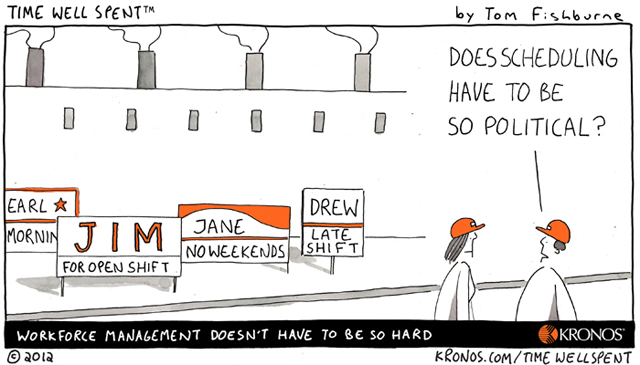Do you expect to have problems with your employees wanting to watch the London Olympics at work?
If it seems like a silly question (that is, you wonder why I’m asking something so ridiculous), it’s only because large sporting events like the Olympics and the NCAA men’s basketball tournament (aka, March Madness) seems to bring out all sorts of silly surveys from consultants and research firms with warnings that slacker employees are going to be so focused on the games that they aren’t going to be focused on their job.
I’ve never believed those surveys because I think they are grossly overblown, and so does my colleague Lance Haun. They fly in the face of what I have personally observed and anecdotally heard, and I have never once come across a manager who worries about it.
10 reasons to let workers watch the Olympics
So, as you prepare to enjoy the Summer Olympics at home, let me share with you some thoughts from a guy named Steve Siebold, who is described as “a former professional athlete; mental toughness coach to professional athletes, entrepreneurs, and Fortune 500 corporations; and author of the book 177 Mental Toughness Secrets of The World Class.”
Instead of hitting us with a questionable survey, Siebold takes the position that watching the Olympics on the job is actually a good thing and that you should allow it because it’s good for your employee’s work ethic. And, he gives 10 reasons why he believes that:
- Because employees will learn that winning isn’t everything, but wanting to win is. “Olympians have a “Whatever it takes” attitude. They’ve made the decision to pay any price and bear any burden in the name of victory.”
- Because employees will learn that Olympic athletes embrace conflict for growth. “When most people run into an obstacle, they seek escape. Olympic athletes have a plan to push forward when this happens and learn all they can from the challenges they face. They know facing adversity is part of being successful.”
- Because employees will learn that Olympic athletes are held accountable on so many levels. “One of the biggest problems is that most people have no means of accountability or a support system in place when it comes to what they’re trying to accomplish.”
- Because employees will learn that Olympic athletes are learning machines. They spend hours practicing, studying their competitors, watching videos of their performances and session after session with their coaches and mentors. If your employees adopted just a fraction of an Olympian’s work ethic, the results they could achieve would be endless.
- Because employees will learn Olympic champions know very good is bad. “For the average employee, to be classified as very good is something to be proud of. For the great ones, it’s an insult.”
- Because employees will learn Olympic athletes make “Do or die” commitments. “When most people are burned out from the battle, Olympians are just getting warmed up. It’s not that they don’t fatigue; but their commitment to their dream of winning the gold keeps them going.”
- Because employees will learn Olympic athletes are consistently great. “The reason they are so consistent is because their actions are congruent with their thought processes. They have a very clear mental picture of what they want, why they want it and how to move closer to their target objective.”
- Because employees will learn Olympians are coachable. “Most people will only accept the amount of coaching their egos will allow. Champions like Olympic athletes are well known for being the most open to world-class coaching. The bigger the champion, the more open-minded they are.”
- Because employees will learn Olympians compartmentalize their emotions. “In other words, they have the ability to put aside anything else going on at that very moment, and focus only on the task in front of them.”
- Because employees will learn Olympians think big. “Ask most people what they’re thinking at any given time, and you might be surprised to learn how many think about just getting by. That’s called selling yourself short. Olympians are fearless and focused on manifesting their ultimate dream of bringing home the gold.”
Yes, 16% will watch the Games on the job
 These are all interesting observations, and maybe a few are relevant for you and your workforce. They’re certainly more useful than another gloom-and-doom, everyone-is goofing-off-watching-sporting-events-at-work survey.
These are all interesting observations, and maybe a few are relevant for you and your workforce. They’re certainly more useful than another gloom-and-doom, everyone-is goofing-off-watching-sporting-events-at-work survey.
Oh, and by the way, Workplace Options just released a poll that says that “an overwhelming majority of American workers (84 percent) say they will forgo the temptation to follow live action from the 2012 Summer Olympic Games in London” during the work day the next two weeks.
Reading it another way, it means that 16 percent of workers WILL be watching the London Olympics on the job. That still sounds like a lot to me, and I’m still not sure I believe it, so maybe sticking with Steve Siebold’s 10 Olympic tips is the better way to go.
Do Millennials understand “face time?”
Of course, there’s a lot more going on than just the opening of the London Olympics. Here are some HR and workplace-related items you may have missed. This is TLNT’s weekly round-up of news, trends, and insights from the world of talent management. I do it so you don’t have to.
- When “temp” starts to look permanent. This NPR story highlights what we probably already have suspected: that companies are avoiding permanent hires and are instead just using “temp” workers instead. “While the job market remains sluggish, temporary work is one area that’s done very well in the economic recovery. … The average daily number of temporary workers employed during the first quarter of 2012 was more than 2.5 million. That’s up from a low of 2.1 million in early 2009, according to the American Staffing Association. “It is clear that companies are using temp and contract workers — and unfortunately not making those permanent hires — at this point,” says Joanie Ruge, senior vice president and chief employment officer for the temp agency Randstad Holding.”
- Tuition benefits for lowest paid employees. According to the Seattle Times, Amazon.com “has created a program to send some of its lowest-paid workers back to school to learn new skills. … (CEO Jeff) Bezos said Amazon will prepay 95 percent of the cost of tuition, up to $2,000 annually, in fast-growing areas for full-time, hourly employees with at least three years’ tenure. Eligible fields of study include aircraft mechanics, computer-aided design, machine-tool technologies and nursing.”
- Does Gen Y understand the concept of “face time?” Miami Herald workplace columnist/blogger Cindy Krischer Goodman (she’s going to be speaking at the 2013 TLNT Transform conference next April) this week dug into the notion of Millennials and face time. “When I talked with Amanda Delprate a few days ago, I had an “aha moment,” she wrote. “I finally understood the viewpoint of Gen Y and how crazy it seems to them that managers want young workers to put in face time. … Amanda wonders “what’s with the insistence on face time?” … (and) that’s a question young workers are asking every day in workplaces of all sizes, in all industries and in all cities. At the same time, their bosses don’t understand why these young workers don’t see the incredible value of bouncing an idea off co-workers, chatting up a boss in the hallway or eating in the employee lunchroom.”
- Kronos Time Well Spent cartoon. Kronos, the company that probably makes your organization’s time-and-attendance systems, publishes a regular Time Well Spent workplace cartoon by Tom Fishburne. I post them here from time to time in the Weekly Wrap.

